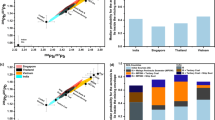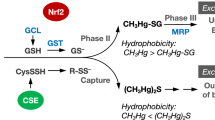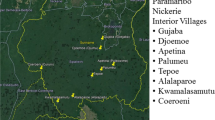Abstract
LEAD is one of the most toxic metals found in the environment and is of great concern because of its widespread occurrence in nature, but its fate is largely unknown1. Much of the lead dispersed by man is eventually washed into natural waters and is presumably precipitated into the sediments2. The methylation of mercury and arsenic by microorganisms in the environment has been documented and well summarised3. Nothing, however, has been known about the existence of organic forms of lead in the environment as a result of biotransformation4.
This is a preview of subscription content, access via your institution
Access options
Subscribe to this journal
Receive 51 print issues and online access
$199.00 per year
only $3.90 per issue
Buy this article
- Purchase on Springer Link
- Instant access to full article PDF
Prices may be subject to local taxes which are calculated during checkout
Similar content being viewed by others
References
Lead in the Canadian Environment (Publication No. BY 73-7 (ES)) ch. 2 (National Research Council, Canada, 1973).
Labarre, N., Milne, J. B., and Oliver, B. G., J. Water Res., 7, 1215–1218 (1973).
Wood, J. M., Science, 183, 1049–1052 (1974).
Lead. Airborne lead in perspective, 18 (Natn. Acad. Sci. Washington, D.C., 1972).
Shapiro, H., and Frey, F. W., The Organic Compounds of Lead, 288 (Interscience, New York, 1968).
Author information
Authors and Affiliations
Rights and permissions
About this article
Cite this article
WONG, P., CHAU, Y. & LUXON, P. Methylation of lead in the environment. Nature 253, 263–264 (1975). https://doi.org/10.1038/253263a0
Received:
Issue Date:
DOI: https://doi.org/10.1038/253263a0
This article is cited by
-
Effects of aquatic dissolved organic matter redox state on adsorption to goethite
Aquatic Sciences (2023)
-
Isolation and Characterization of Multi-Metal-Resistant Halomonas sp. MG from Tamil Nadu Magnesite Ore Soil in India
Current Microbiology (2015)
-
Biological metal accumulation in the red beds (Guettioua Member) of the Bathonian (Dogger) of Msemrir, Central High Atlas, Morocco
Geologische Rundschau (1992)
Comments
By submitting a comment you agree to abide by our Terms and Community Guidelines. If you find something abusive or that does not comply with our terms or guidelines please flag it as inappropriate.



